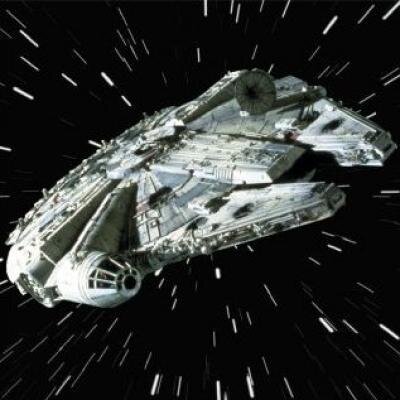Paul Krugman...space colonist?
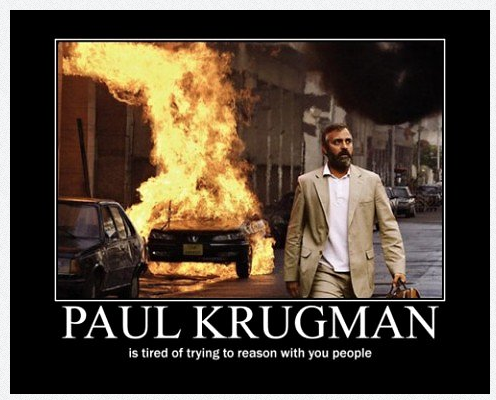 Six years after the last Apollo moon mission, a young assistant professor at Yale wrote about the economics of...interstellar trade. If the economist hadn't been Paul Krugman, I doubt we would remember the attempt. But while his 1978 essay - "The Theory of Interstellar Trade" - was intended to be somewhat of a joke, its combination of some basic physics and economic theory turns out to have some serious points.
Six years after the last Apollo moon mission, a young assistant professor at Yale wrote about the economics of...interstellar trade. If the economist hadn't been Paul Krugman, I doubt we would remember the attempt. But while his 1978 essay - "The Theory of Interstellar Trade" - was intended to be somewhat of a joke, its combination of some basic physics and economic theory turns out to have some serious points.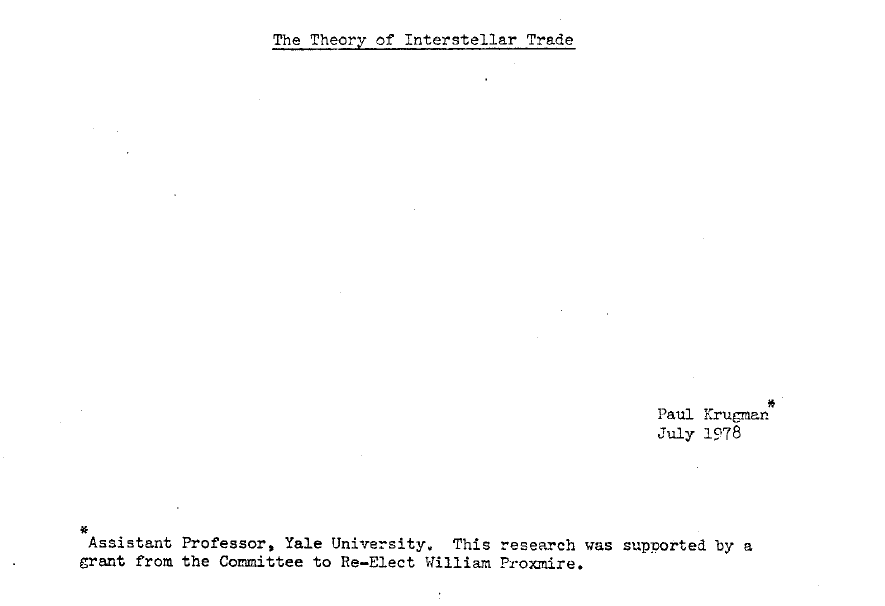
A self-professed science fiction buff, Isaac Asimov's Foundation stories helped launch Krugman's entry into economics. He wrote the short paper when he was "an oppressed assistant professor, caught up in the academic rat race." ((http://krugman.blogs.nytimes.com/2008/03/11/economics-the-final-frontier/)) (This was years before he won the Nobel "for his analysis of trade patterns and location of economic activity."
Despite the essay's absurd-sounding title, it presented an economic analysis of the kind that Asimov would have appreciated. As the paper's introduction states, "while the subject of this paper is silly, the analysis actually does make some sense." The result is a "serious analysis of a ridiculous subject" which, Krugman notes, is "the opposite of what is usual in economics." (Ah - so jaded and yet still an assistant prof.)
"Let's Assume We Have a Can Opener" is classic joke about how professional indoctrination encourages people to make unreasonable assumptions. The butt of the joke is an economist. So - to paraphrase the punchline somewhat - let's assume we have an interstellar starship that can travel close to the speed of light. Krugman wrote his essay in 1978 - a year after Star Wars appeared in theaters - so probably what he had in mind looked something like this:
So - if one is an interstellar trader shuttling, say, dilithium crystals and 'droid parts around the galaxy, "how should interest charges on goods in transit be computed when the goods travel close to the speed of light?" After all, the time of transit will appear less to the space pilot transporting them than it will to the person waiting to receive them on some faraway planet. This makes calculating the true value of our (hypothetical) space commodities quite difficult.In his essay, Krugman used physics and economics to prove "two useless but true theorems." Krugman concluded that one should use clocks on a planet's surface, not on board the traveling vessel, to calculate interest costs. The reason is obvious - a trader on Trantor (Krugman's choice) could have invested her money in a bond. Instead, they invested it in cargo. Therefore, the opportunity cost of trade should be based on the passage of time on Trantor. As Krugman phrased it: "When trade takes place between two planets in a common inertial frame, the interest cost on goods in transit should be calculated using time measured by clocks in the common frame."Krugman's second point concerns "interstellar capital movements." Krugman's "First Fundamental Theorem" assumed equal interest rates on the two planets. But wouldn't interstellar movement of capital distort interest rates because "simultaneous arbitrage is not possible"? In other words, while goods move slowly, information about their circulation moves at the speed of light.
Krugman concluded that one should use clocks on a planet's surface, not on board the traveling vessel, to calculate interest costs. The reason is obvious - a trader on Trantor (Krugman's choice) could have invested her money in a bond. Instead, they invested it in cargo. Therefore, the opportunity cost of trade should be based on the passage of time on Trantor. As Krugman phrased it: "When trade takes place between two planets in a common inertial frame, the interest cost on goods in transit should be calculated using time measured by clocks in the common frame."Krugman's second point concerns "interstellar capital movements." Krugman's "First Fundamental Theorem" assumed equal interest rates on the two planets. But wouldn't interstellar movement of capital distort interest rates because "simultaneous arbitrage is not possible"? In other words, while goods move slowly, information about their circulation moves at the speed of light.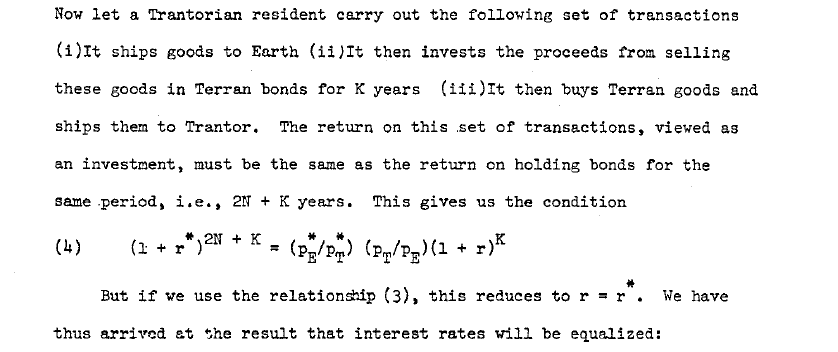 Krugman's "Second Fundamental Theorem of Interstellar Trade" concluded that this needn't be a problem: "If sentient beings may hold assets on two planets in the same inertial frame, competition will equalize the interest rates on the two planets." (Another economist read Krugman's essay and concluded that "in such worlds the real interest rate cannot exceed the costs at which more fuel can propel you into the future through time dilation...as The Economist interpreted this: "Better buy antimatter futures while they are cheap.")So -- we now have what the future Nobel winner called a "foundation for a coherent theory of interstellar trade." It's a picture of the universe that is "not a lunatic vision; stellar, maybe but not lunatic." The double entendre here is a nice touch as Krugman's theorems are less relevant for more "mundane" financial transactions between traders on the earth and the moon. Krugman's conclusion: space might be "the Final Frontier of economics."OK - so I've been having some fun with Krugman's essay (in the same spirit in which he wrote it.) But scattered throughout it are hints which point to some other interesting possibilities. First of all, Krugman - like many people his age - was aware of the public interest in space settlements stirred up by Gerard O'Neill's visioneering. His essay, in fact, cites O'Neill's book The High Frontier. (Of course, Krugman also cites Lawden's Introduction to Tensor Calculus, Relativity, and Cosmology so we probably shouldn't read too much into his bibliography.)
Krugman's "Second Fundamental Theorem of Interstellar Trade" concluded that this needn't be a problem: "If sentient beings may hold assets on two planets in the same inertial frame, competition will equalize the interest rates on the two planets." (Another economist read Krugman's essay and concluded that "in such worlds the real interest rate cannot exceed the costs at which more fuel can propel you into the future through time dilation...as The Economist interpreted this: "Better buy antimatter futures while they are cheap.")So -- we now have what the future Nobel winner called a "foundation for a coherent theory of interstellar trade." It's a picture of the universe that is "not a lunatic vision; stellar, maybe but not lunatic." The double entendre here is a nice touch as Krugman's theorems are less relevant for more "mundane" financial transactions between traders on the earth and the moon. Krugman's conclusion: space might be "the Final Frontier of economics."OK - so I've been having some fun with Krugman's essay (in the same spirit in which he wrote it.) But scattered throughout it are hints which point to some other interesting possibilities. First of all, Krugman - like many people his age - was aware of the public interest in space settlements stirred up by Gerard O'Neill's visioneering. His essay, in fact, cites O'Neill's book The High Frontier. (Of course, Krugman also cites Lawden's Introduction to Tensor Calculus, Relativity, and Cosmology so we probably shouldn't read too much into his bibliography.)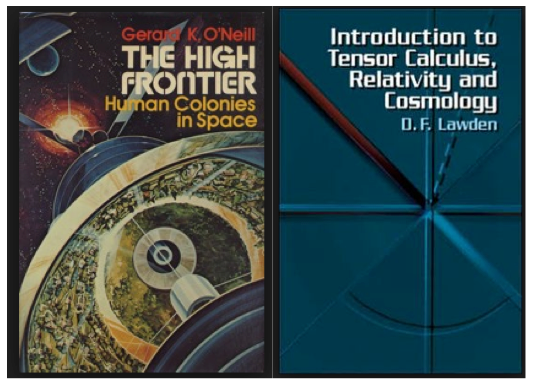 Another little puzzle is found on the title page of Krugman's essay - he notes his research was supported by a "grant from the Committee to Re-Elect William Proxmire." Famed for his Golden Fleece awards given to protest government waste, the former Wisconsin senator became known as “Darth Proxmire” to O'Neill supporters. In fact, after CBS's 60 Minutes ran a segment featuring O'Neill and his ideas, Proxmire was so incensed that he promised “not a penny for this nutty fantasy” and suggested instead that an irresponsible NASA should instead have its budget cut. (The CBS piece implied the agency was seriously considering O'Neill’s ideas. It wasn't.) Why did Krugman single out Proxmire? Was he making a joke because of Proxmire's dislike of O'Neill-style space settlement ideas? Or did Krugman sympathize with them?Krugman's foray into the economics of interstellar economics aside, there actually was a small community of people writing about such things circa 1978. Although most people realized that they would likely not be able to actually build a space colony (or an interstellar spaceship), the participants in the summer studies that NASA helped sponsor (and Gerard O'Neill helped organize) considered what living on a space settlement might be like. This demanded taking anthropology, sociology, and, of course, economics into account.
Another little puzzle is found on the title page of Krugman's essay - he notes his research was supported by a "grant from the Committee to Re-Elect William Proxmire." Famed for his Golden Fleece awards given to protest government waste, the former Wisconsin senator became known as “Darth Proxmire” to O'Neill supporters. In fact, after CBS's 60 Minutes ran a segment featuring O'Neill and his ideas, Proxmire was so incensed that he promised “not a penny for this nutty fantasy” and suggested instead that an irresponsible NASA should instead have its budget cut. (The CBS piece implied the agency was seriously considering O'Neill’s ideas. It wasn't.) Why did Krugman single out Proxmire? Was he making a joke because of Proxmire's dislike of O'Neill-style space settlement ideas? Or did Krugman sympathize with them?Krugman's foray into the economics of interstellar economics aside, there actually was a small community of people writing about such things circa 1978. Although most people realized that they would likely not be able to actually build a space colony (or an interstellar spaceship), the participants in the summer studies that NASA helped sponsor (and Gerard O'Neill helped organize) considered what living on a space settlement might be like. This demanded taking anthropology, sociology, and, of course, economics into account.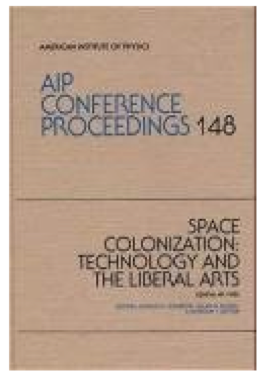 Given the fondness that many in the space settlement movement had for libertarian thought, it's not surprising that a good deal of attention was given to what sorts of future financial and economic systems would/could be enacted. At MIT, the Department of Aeronautics and Astronautics offered a new undergraduate course on “space systems engineering”. For an entire semester, undergraduate and graduate students studied the engineering needed to build a small, industrial space settlement. ((MIT published the class’s final product as “A Systems Design for a Prototype Space Colony,” Spring 1976.)) Other schools used the "Colonization of Space” topic to introduce undergraduates to “current topics in science and technology.” ((For example, see the essays collected in Charles H. Holbrow, Allan M. Russell, and Gordon Sutton, F., eds., Space Colonization: Technology and the Liberal Arts (New York: American Institute of Physics, 1986).)) This attempt to jumpstart the curriculum reflected a more general trend of drawing students to science through nontraditional approaches such as the “Zen of physics."So, while Krugman's essay might have been only semi-serious, it connected to other ideas circulating at the time, some of which the economist/science fiction fan was aware of. For me, the best convergence happened in 2000. This was the year Krugman left MIT for Princeton University, the same school where Gerry O'Neill spent his academic career.
Given the fondness that many in the space settlement movement had for libertarian thought, it's not surprising that a good deal of attention was given to what sorts of future financial and economic systems would/could be enacted. At MIT, the Department of Aeronautics and Astronautics offered a new undergraduate course on “space systems engineering”. For an entire semester, undergraduate and graduate students studied the engineering needed to build a small, industrial space settlement. ((MIT published the class’s final product as “A Systems Design for a Prototype Space Colony,” Spring 1976.)) Other schools used the "Colonization of Space” topic to introduce undergraduates to “current topics in science and technology.” ((For example, see the essays collected in Charles H. Holbrow, Allan M. Russell, and Gordon Sutton, F., eds., Space Colonization: Technology and the Liberal Arts (New York: American Institute of Physics, 1986).)) This attempt to jumpstart the curriculum reflected a more general trend of drawing students to science through nontraditional approaches such as the “Zen of physics."So, while Krugman's essay might have been only semi-serious, it connected to other ideas circulating at the time, some of which the economist/science fiction fan was aware of. For me, the best convergence happened in 2000. This was the year Krugman left MIT for Princeton University, the same school where Gerry O'Neill spent his academic career.
